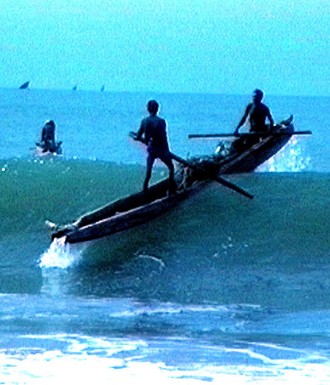
Fishing in the Sea of Greed 1998
Distributed by First Run/Icarus Films, 32 Court St., 21st Floor, Brooklyn, NY 11201; 800-876-1710
Produced by Anand Patwardhan
Directed by Anand Patwardhan
VHS, color, 45 min.
High School - Adult
Environmental Studies
Date Entered: 11/09/2018
Reviewed by Barb Butler, Oregon Institute of Marine BiologyWe have become very proficient in our ability to harvest fish. The Food and Agriculture Organization of the United Nations and the World Wildlife Fund both believe we are over harvesting our fish stocks, and there is no doubt that fish populations have declined. Part of the problem is that large fishing fleets employ factory ships capable of catching and processing huge amounts of fish. By some accounts, we now have enough factory ships to catch two-and-a-half times the prudent sustainable harvest of fish each year.
Fishing in the Sea of Greed tells the story of Bangladeshi and Indian subsistence fishermen. The livelihood of these fishermen was threatened in the 1970's by the introduction of mechanized trolling boats. A much larger threat appeared in the 1990's when the Indian government gave foreign factory ships permission to fish in Indian coastal waters. A factory ship can catch and process in a day the amount of fish that can be harvested by 1,000 Kattamaram fishermen in an entire year. Despite laws that protect the shoreline from pollution and construction, damage to the coastal zone is also threatening the wellbeing of Indians and Bangladeshis. The primary problems in the coastal zone are sand harvesting, mangrove destruction and aquaculture activities. One of the main culprits is industrial shrimp culture, which causes the salinization of adjacent rice paddies and pollution of freshwater resources.
The efforts of the National Fishworkers Forum are highlighted in this film. The group undertook hunger strikes, blocked access to harbors and led demonstrations to call attention to the fishworkers plight. They have reached beyond their own borders to collaborate and communicate with fishworkers worldwide. As a result of their international efforts, November 21st is now celebrated as World Fisheries Day.
Fishing in the Sea of Greed is a loosely edited documentary and the film at times makes awkward jumps. There is little narration and the majority of dialog appears in subtitles. Viewers must gather for themselves the story that is being presented. This film provides a vivid and colorful glimpse of Indian life, but the message of this film may be lost on younger viewers. Fishing in the Sea of Greed is appropriate for high school to adult viewers and would be an appropriate addition to school, public and college libraries